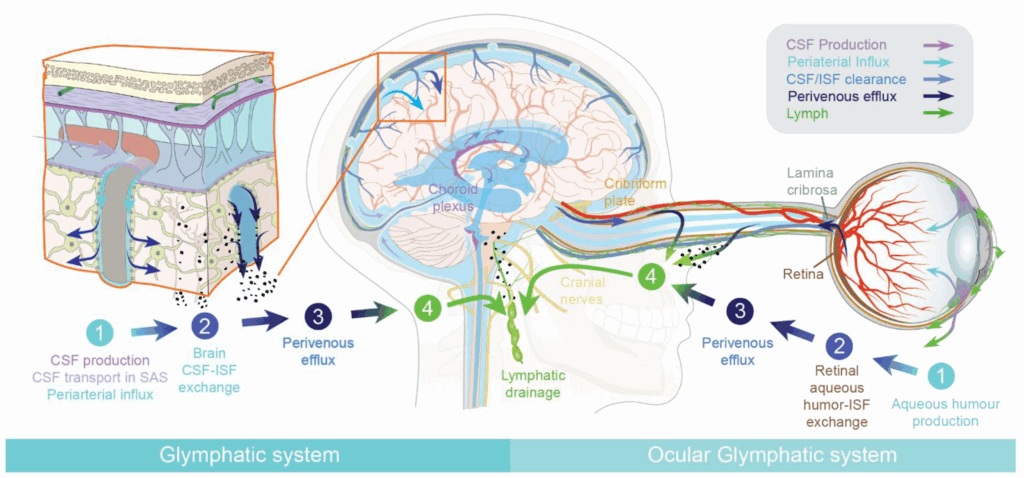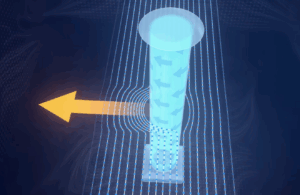What is it and why is it important?
When we sleep, we aren’t aware of anything that is happening; yet while we appear dormant on the outside, our brain and body systems are incredibly active on the inside. Some systems, such as the cardiovascular and respiratory systems, slow down during sleep (1). However, other systems that are suppressed while you’re awake become functional. One such system is the glymphatic system, a system that most people are unaware of, but which is crucial for keeping us alive.
The glymphatic system is an extension of the more commonly-known lymphatic system. Simply put, the lymphatic system acts as a drainage system by collecting excess fluid from the blood and returning it to the bloodstream to maintain a healthy balance throughout the body (2). The glymphatic system’s function is specifically focused on the brain and central nervous system.
Only recently discovered, the glymphatic system is a network that clears waste from the brain and central nervous system (3, 4). The system relies on two key components of the brain: cerebrospinal fluid (CSF) and interstitial fluid (ISF) (4). CSF flows through brain tissue due to the pulsing of our arteries (3). As it flows, it is forced into the spaces next to the smaller blood vessels that enter the brain, where it interchanges with ISF (3, 4). This exchange is possible due to the presence of Aquaporin 4, a unique membrane protein (4). The exchange between CSF and ISF creates a fluid that collects soluble proteins and metabolic waste as it flows through the brain tissue and eliminates those substances from the central nervous system (3, 5). Finally, the fluid drains into a special fluid compartment called the perivenous space (4, 5), carrying the waste to be filtered by the liver and kidneys and eventually excreted while the fluid returns to the bloodstream (5, 6).

Without the glymphatic system, toxins and waste would accumulate, resulting in neurological diseases, including Alzheimer’s, stroke, epilepsy, and meningitis (5). Even worse, the glymphatic system naturally weakens as we age (3). This is due to a combination of decreased CSF production and stiffness in the arteries. Our personal bad habits are also detrimental to our glymphatic system. For example, sleep deprivation influences the position of the pathways through which the fluids are flowing (3).
While researchers look for methods to target and treat neurological diseases through the glymphatic system (5), there are plenty of small things that everyone should be doing to keep their glymphatic and lymphatic systems in good condition. Consistent exercise, staying hydrated, and minimizing exposure to chemicals are all small things that we can do every day to help out one of the most overlooked aspects of maintaining a healthy life (2).

References
- DiGiulio, S. (2017, October 9). What Happens in Your Body and Brain While You Sleep. NBC News; NBC News. https://www.nbcnews.com/better/health/what-happens-your-body-brain-while-you-sleep-ncna805276#
- Cleveland Clinic. (2023, July 31). Lymphatic System. Lymphatic System. https://my.clevelandclinic.org/health/body/21199-lymphatic-system
- Understanding the Glymphatic System. (2018, July 17). Neuronline.sfn.org. https://neuronline.sfn.org/scientific-research/understanding-the-glymphatic-system
- Jessen, N. A., Munk, A. S. F., Lundgaard, I., & Nedergaard, M. (2015). The Glymphatic System: a Beginner’s Guide. Neurochemical Research, 40(12), 2583–2599. https://doi.org/10.1007/s11064-015-1581-6
- Gao, Y., Liu, K., & Zhu, J. (2023). Glymphatic system: an emerging therapeutic approach for neurological disorders. Frontiers in Molecular Neuroscience, 16. https://doi.org/10.3389/fnmol.2023.1138769
- Macmillan Cancer Support. (2018, October 1). The lymphatic system. Macmillan.org.uk. https://www.macmillan.org.uk/cancer-information-and-support/worried-about-cancer/the-lymphatic-system
Images






Comments are closed.